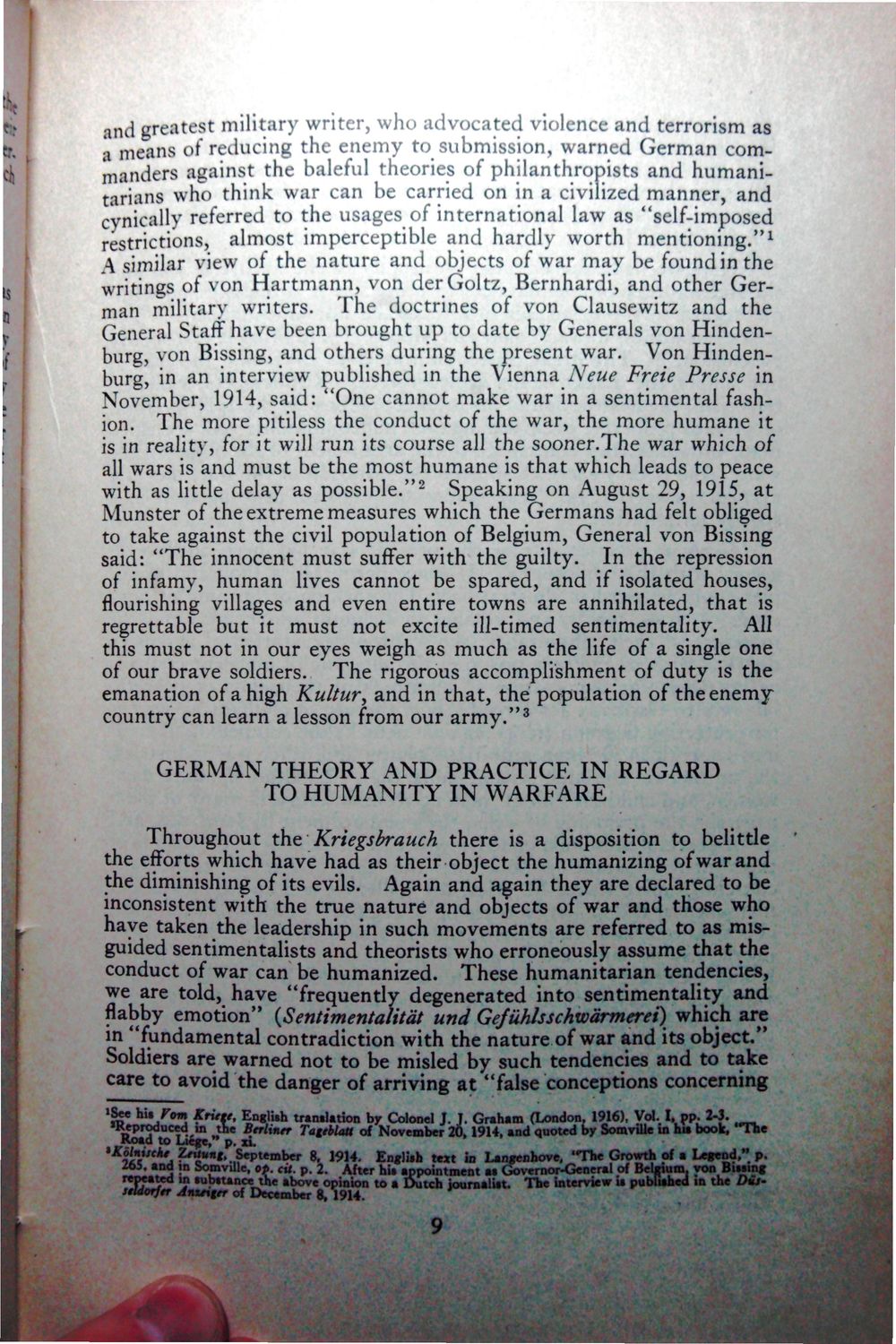| |
| |
Caption: War Publications - WWI Compilation 1923 - Article 14
This is a reduced-resolution page image for fast online browsing.

EXTRACTED TEXT FROM PAGE:
* and greatest military writer, who advocated violence and terrorism as a means of reducing the enemy to submission, warned German commanders against the baleful theories of philanthropists and humanitarians who think war can be carried on in a civilized manner, and cynically referred to the usages of international law as "self-imposed 1 restrictions, almost imperceptible and hardly worth mentioning.'* A similar view of the nature and objects of war may be found in the writings of von Hartmann, von derGoltz, Bernhardt and other German military writers. The doctrines of von Clausewitz and the General Staff have been brought up to date by Generals von Hindenburg, von Bissing, and others during the present war. Von Hindenburg, in an interview published in the Vienna Neue Freie Presse in November, 1914, said: "One cannot make war in a sentimental fashion. The more pitiless the conduct of the war, the more humane it is in reality, for it will run its course all the sooner.The war which of all wars is and must be the most humane is that which leads to peace 2 with as little delay as possible." Speaking on August 29, 1915, at Munster of the extreme measures which the Germans had felt obliged to take against the civil population of Belgium, General von Bissing said: "The innocent must suffer with the guilty. In the repression of infamy, human lives cannot be spared, and if isolated houses, flourishing villages and even entire towns are annihilated, that is regrettable but it must not excite ill-timed sentimentality. All this must not in our eyes weigh as much as the life of a single one of our brave soldiers. The rigorous accomplishment of duty is the emanation of a high Kultury and in that, the papulation of the enemy 3 country can learn a lesson from our army." GERMAN THEORY A N D PRACTICE IN REGARD TO HUMANITY IN WARFARE Throughout the Kriegsbrauch there is a disposition to belittle the efforts which have had as their object the humanizing of war and the diminishing of its evils. Again and again they are declared to be inconsistent with the true nature and objects of war and those who have taken the leadership in such movements are referred to as misguided sentimentalists and theorists who erroneously assume that the conduct of war can be humanized. These humanitarian tendencies, we are told, have "frequently degenerated into sentimentality and flabby emotion" {Sentimentalitat und Gefuhlsschwarmerei) which are in "fundamental contradiction with the nature of war and its object/' Soldiers are warned not to be misled by such tendencies and to take care to avoid the danger of arriving at "false conceptions concerning 1 » * iL °*5 ^ " F ' EngUth translation by Colonel J. J. Graham (London, 1916), Vol.. I. pp. 2-3. ^Reproduced in the Berliner Tageblatt of November 2G, 1914, and quoted by Somville in hit book, "The Road to Liepe," p. n. •Kolnuche Zeuung, September 8, 1914. Engliih text in Langcnhove, 'The Growth of a Legend," p. ^65, and m Somville, op. cit. p. 2. After hit appointment at Governor-General of Belgium, yon Bitting repeated m tubttance the above opinion to a Dutch iournalitt. The interview it pubUthed in the DHJseUorfer Anxe\ter of December 8_ 1QU. *^ h r 9 ^m
| |